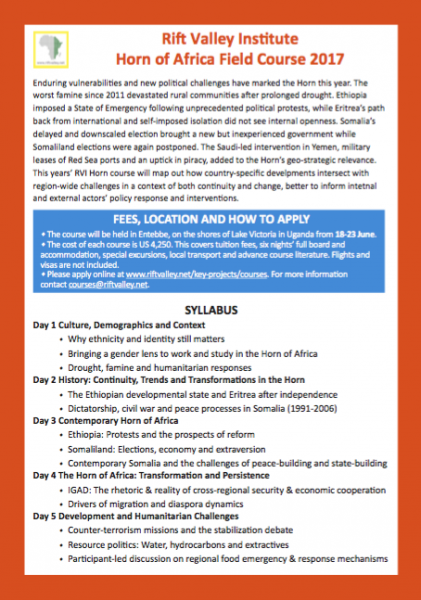The Horn of Africa Course covers Ethiopia, the Somali regions, Eritrea, Djibouti, and northern Kenya. The social and political histories of each country in the Horn of Africa are examined to contextualise the continuities and transformations that are taking place across the region. A variety of disciplinary perspectives and new research is brought to bear on conflict, climate and environmental change, livelihoods, hydro-politics, gender, culture, migration and the challenges of foreign aid to build a holistic understanding of contemporary developments and crises afflicting the peoples of the Horn.
Globalization, demographic pressures and demands for better governance and economic development have placed the peoples of the Horn of Africa at a crossroads.
 In Ethiopia an unprecedented mass protest movement, the proclamation of a State of Emergency, and challenges within the ruling party have disrupted the post-1991 political order. In Somalia, a long and contentious process of creating new regional states and selecting a new government offers both significant promise and the potential for a return to violence. Somaliland has elections scheduled for Spring 2017 but it remains unclear if they will be held or postponed in the context of a drought and food emergency. Kenya, with troops deployed in Somalia, has elections scheduled for August 2017, and may advance the uneven process of democratization or set off heightened political divisions.
In Ethiopia an unprecedented mass protest movement, the proclamation of a State of Emergency, and challenges within the ruling party have disrupted the post-1991 political order. In Somalia, a long and contentious process of creating new regional states and selecting a new government offers both significant promise and the potential for a return to violence. Somaliland has elections scheduled for Spring 2017 but it remains unclear if they will be held or postponed in the context of a drought and food emergency. Kenya, with troops deployed in Somalia, has elections scheduled for August 2017, and may advance the uneven process of democratization or set off heightened political divisions.
The economic picture is similarly mixed. On the one hand, there is the ‘Ethiopia Rising’ narrative and a growing mining sector in Eritrea. On the other hand, there is a mounting food crisis and resource scarcity affecting many parts of the region, and major international investments are challenged by political instability, such as in Djibouti.
Regional organizations are experimenting with innovative ways to engage with regional problems. Yet they still lack the resources and commitment from member states to make significant progress in the region. The international community’s commitment to the Horn is shifting, with increasing concerns about immigration and major political upheaval in Europe and North America offering both new approaches with uncertain implications.
RVI’s 2017 Horn of Africa course will pay special attention to these contradictory trends of transformation and persistence, and the ways in which these are shaping the lives and livelihoods of citizens of the Horn.
The Co-Directors of Studies for the course will be Laura Hammond and Terrence Lyons. They will be joined by a team of leading regional and international experts. These will be announced over the course of the coming months.
Highlights of the syllabus
DAY 1 Culture, Demographics and Context
- Why ethnicity and identity still matter
- Bringing a gender lens to work and study in the Horn of Africa
- Drought, famine and humanitarian responses
DAY 2 History: Continuity, Trends and Transformations in the Horn
- The Ethiopian developmental state
- Eritrea after independence
- Dictatorship, civil war and peace processes in Somalia (1991-2006)
DAY 3 Contemporary Horn of Africa
- Ethiopia: Protests and the psospects of reform
- Somaliland: Elections, economy and extraversion
- Contemporary Somalia and the challenges of peace-building and state-building
DAY 4 The Horn of Africa: Transformation and Persistence
- IGAD: The rhetoric and reality of cross-regional security and economic cooperation
- Drivers of migration and diaspora dynamics
DAY 5 Development and Humanitarian Challenges
- Counter-terrorism missions and the stabilization debate
- Resource politics: Water, hydrocarbons and extractives
- Participant-led discussion on regional food emergency and response mechanisms
Core teaching staff
Laura Hammond PhD, Co-Director of Studies
Reader in Development Studies, School of Oriental and African Studies
Terrence Lyons PhD, Co-Director of Studies
Professor of Conflict Analysis and Resolution, George Mason University
Ken Menkhaus PhD
Davidson College, North Carolina
Lealem Mersha
Independent Researcher
Rashid Abdi
Horn of Africa Analyst, International Crisis Group
Dereje Feyissa PhD
Addis Ababa University
Fadumo Dayib
Somalia Presidential Candidate, 2016
Michael Woldemariam PhD
Assistant Professor, Boston University
Lee Cassanelli PhD
Associate Professor of History, University of Pennsylvania



